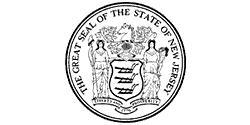

STATE OF NEW JERSEY
Division of The Ratepayer Advocate
31 Clinton Street, 11th Fl
P. O. Box 46005
Newark, New Jersey 07101
| RICHARD J. CODEY |
SEEMA
M. SINGH, Esq.
|
| TESTIMONY OF SEEMA
M. SINGH, ESQ.
RATEPAYER ADVOCATE NJ DIVISION OF THE RATEPAYER ADVOCATE In Support of A-516 and S-332 Senate Economic Growth Committee Good morning Senator Lesniak and members of the committee. Thank you for providing me with the opportunity to testify today on behalf of Ratepayer Advocate Seema Singh. My name is Robert Brabston and I’m the Acting Deputy Director of the Division of the Ratepayer Advocate.
Energy efficiency programs are a low-cost, high-benefit way to meet society’s
ever-increasing energy needs. As we discovered from the major blackouts
two summers ago, not only is electricity vital to maintain a minimally
safe and comfortable standard of living, is also crucial to our hopes
for economic prosperity for all. Every avenue should be explored to reduce
our energy consumption and increase energy efficiency. This would in turn
reduce the strain on our electric transmission system. By way of background, energy efficiency standards for appliances and
equipment establish a minimum for the efficiency of converting input fuel
--electricity, gas, or oil -- into useful energy. Appliances that use
more input energy than the minimum set by these standards cannot be sold
in a jurisdiction with such standards. Appliance efficiency standards were first instituted by several states
in the 1970s. When the National Appliance Energy Conservation Act was
passed in 1987, it established federal efficiency standards. Federal standards
replaced most state standards, and were expanded over time to include
dozens of types of energy-using appliances and equipment. Under federal
law as amended in 1988 and 1992, the U.S. Department of Energy (or “DOE”)
has the authority to investigate and promulgate improvements to appliance
and equipment efficiency standards. The benefits of the federal efficiency standards have been documented
in studies by the DOE and the American Council for an Energy-Efficient
Economy (or “ACEEE”). For example, new refrigerators today use less than
one-third of the electricity that they used back in 1976, when California
introduced the first refrigerator efficiency standards. On top of this,
these appliances cost much less to buy today than they did back then.
The history with refrigerators, whose prices have been covered under the
federal efficiency program since 1987, shows how beneficial appliance
efficiency standards can be. While the federal appliance efficiency program has accomplished much,
it has been at a plateau over the past few years, taking only relatively
modest steps compared to what is possible in light of new technology.
For this reason, several states are looking at appliance efficiency standards
again. They are looking at items of equipment that are not federally regulated
at this time. The idea is to gain the benefits of improved energy efficiency
while at the same time leading the federal government by example, just
as happened originally before the first federal action on appliance efficiency
was taken. In studies such as “Opportunities for New Appliance and Equipment Efficiency
Standards: Energy and Economic Savings Beyond Current Standards Programs”
(2001), the ACEEE has shown that substantial economic and environmental
benefits can be achieved from new efficiency standards for certain types
of equipment not currently regulated. The legislation addresses many of
these opportunities. The bill begins with products that are not regulated by the federal government,
and for this reason, is a useful complement to the existing federal efficiency
program. The efficiency standards that this bill promulgates have been
thoughtfully and carefully designed. They draw on research, testing, and
rating of equipment that has already been done by government agencies
and research institutions. Moreover, the identical efficiency standards
for these products are being promoted in several other state legislatures
by the Northeast Energy Efficiency Partnership, a non-governmental organization
that is very active on energy efficiency issues throughout the region,
and by other groups. The equipment covered under the legislation is currently promoted through
the New Jersey Clean Energy Programs funded by utility ratepayers. If
this bill is passed, the Clean Energy Program initiatives can focus on
the many other technologies they promote. This bill will help the Clean
Energy Program to achieve its objectives, without adding any additional
costs to it. In conclusion, energy efficiency reduces the growth in demand for electricity,
gas, and oil. It enables us to do more with our finite energy resources.
It reduces consumer costs to meet energy needs. It reduces the emissions
of harmful air pollutants as well as emissions of carbon dioxide, which
contributes to global warming. State appliance and equipment efficiency
standards will help to realize these benefits of energy efficiency. For
these reasons, we support this bill. The Ratepayer Advocate is committed to working toward promoting and increasing
energy efficiency standards which will reduce the strain on our electricity
grid, and improve our air quality and environment. Again, thank you for the opportunity to speak to you today.
|
|
ratepayer advocate: home
| electric
| gas
| telco
| water/wastewater
| news
& info. | press
releases | case
matters | publications
| consumer
info. | links |
|